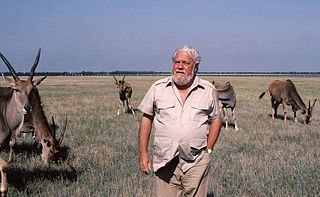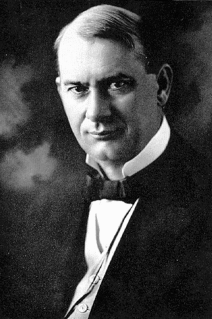A Quote by James Madison
Man, who preys both on the vegetable and animal species, is himself a prey to neither. He too possesses the reproductive principle far beyond the degree requisite for the bare continuance of his species. What becomes of the surplus of human life to which this principle is competent?
Related Quotes
It must be stressed that there is nothing insulting about looking at people as animals. We are animals, after all. Homo sapiens is a species of primate, a biological phenomenon dominated by biological rules, like any other species. Human nature is no more than one particular kind of animal nature. Agreed, the human species is an extraordinary animal; but all other species are also extraordinary animals, each in their own way, and the scientific man-watcher can bring many fresh insights to the study of human affairs if he can retain this basic attitude of evolutionary humility.
You cannot begin to preserve any species of animal unless you preserve the habitat in which it dwells. Disturb or destroy that habitat and you will exterminate the species as surely as if you had shot it. So conservation means that we have to preserve forest and grassland, river and lake, even the sea itself. This is vital not only for the preservation of animal life generally, but for the future existence of man himself - a point that seems to escape many people.
Researchers keep identifying new species, but they have no idea about the life cycle of a given species or its other hosts. They cut open an animal and find a new species. Where did it come from? What effect does it have on its host? What is its next host? They don't know and they don't have time to find out, because there are too many other species waiting to be discovered and described.
the scientist's religious feeling takes the form of a rapturous amazement at the harmony of natural law, which reveals an intelligence of such superiority that, compared with it, all the systematic thinking and acting of human beings is utterly insignificant reflection. This feeling is the guiding principle of his life and work, in so far as he succeeds in keeping himself from the shackles of selfish desire. It is beyond question closely akin to that which has possessed the religious geniuses of all ages.
We discover too late that we have turned a blind eye to the extinction of a species that is essential to the balance of life in a particular context. Or we discover too late that the importation of a foreign life-form, animal or vegetable, has upset local ecosystems, damaging soil or neighbouring life-forms. We discover that we have come near the end of supplies-of fossil-fuels for example -on which we have built immense structures of routine expectation.
Man makes history; woman is history. The reproduction of the species is feminine: it runs steadily and quietly through all species, animal or human, through all short-lived cultures. It is primary, unchanging, everlasting, maternal, plantlike, and cultureless. If we look back we find that it is synonymous with life itself.
The human species was given dominion over the earth and took the opportunity to exterminate other species and warm the atmosphere and generally ruin things in its own image, but it paid this price for its privileges: that the finite and specific animal body of this species contained a brain capable of conceiving the infinite and wishing to be infinite itself.
Degrees of ability vary, but the basic principle remains the same: the degree of a man's independence, initiative and personal love for his work determines his talent as a worker and his worth as a man. Independence is the only gauge of human virtue and value. What a man is and makes of himself; not what he has or hasn't done for others. There is no substitute for personal dignity. There is no standard of personal dignity except independence.
The idea of duty, that recognition of something to be lived for beyond the mere satisfaction of self, is to the moral life what the addition of a great central ganglion is to animal life. No man can begin to mould himself on a faith or an idea without rising to a higher order of experience: a principle of subordination, of self-mastery, has been introduced into his nature; he is no longer a mere bundle of impressions, desires, and impulses.


































